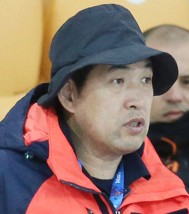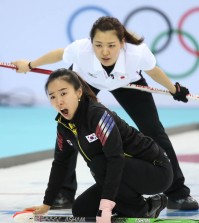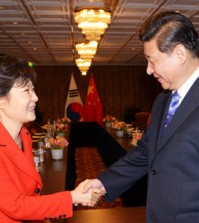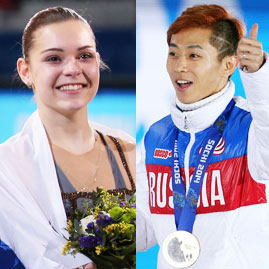- California Assembly OKs highest minimum wage in nation
- S. Korea unveils first graphic cigarette warnings
- US joins with South Korea, Japan in bid to deter North Korea
- LPGA golfer Chun In-gee finally back in action
- S. Korea won’t be top seed in final World Cup qualification round
- US men’s soccer misses 2nd straight Olympics
- US back on track in qualifying with 4-0 win over Guatemala
- High-intensity workout injuries spawn cottage industry
- CDC expands range of Zika mosquitoes into parts of Northeast
- Who knew? ‘The Walking Dead’ is helping families connect
Skating body vice head resigns in Sochi fallout
By Kim Tong-hyung
Jeon Myeong-gyu resigned from his post as the vice chairman of the Korea Skating Union (KSU), Monday, amid controversy over the way the skating body picks athletes for the Olympics.

Jeon Myeong-gyu, who resigned at the vice chairman of the national skating body on Monday, had been long suspected of unfairly favoring athletes from the Korea National Sports University to represent the country in international events. (Yonhap)
Although he technically reported to KSU Chairman Kim Jae-yul, Jeon had been considered the most powerful individual in the organization, wielding a considerable influence in management and the process of selecting athletes for international events.
The KSU is bracing for a government investigation over its alleged lack of transparency.
After Viktor Ahn, a former Korean short-track speed skating great, shined for his adopted homeland, Russia, at the recent Sochi Olympics, Korean President Park Geun-hye wondered out loud last week whether factionalism, favoritism or corruption caused the country to lose one of its best competitors.
Responding to Park’s comments, the Ministry of Culture, Sports and Tourism announced plans to audit the skating body after the Olympics.
Jeon had been long suspected of favoring athletes from the Korea National Sports University (KNSU) to represent the country in international events, an accusation that dates back to his days as the coach of the country’s short-track speed skating team.
Weeks prior to the Sochi Olympics, the KSU was blasted by the media after one of the national team’s short-track coaches ― who had KNSU ties ― was suspended over accusations that he sexually harassed a female trainee in 2012.
That prompted Asian Skating Union President Chang Myong-hi to call for Jeon’s head, claiming that the highly hierarchical organization has entirely lost the ability to police itself.
KSU announced Jeon’s resignation in a news conference held at a restaurant in Seoul, where it also promised to reform. In stepping down, however, Jeon didn’t admit to the accusations of unfairness against him, saying he was simply taking responsibility for Korean short-track skaters performing below expectations in Sochi.
”We will try to adopt a more objective and transparent way to self-review our work,’’ said KSU Chairman Kim, currently helming KSU’s self-reform unit called the ”Skating Development Body.’’
”We will reshuffle the organization accordingly with the direction of the reform, improve the process of selecting athletes on the national team, and strengthen our preparation for the PyeongChang Games.’’
It is difficult to find people coming to the defense of the KSU, widely seen as a murky and ineffective organization.
However, it could also be said that the decay of KSU and other Korean sporting bodies was an inevitable outcome considering the ruthless way that Korea has continued to produce its elite athletes since the 1970s.
Critics believe such regressive practices will continue to manifest unless the country tries to be less committed and ideological about linking sporting achievements with nationalism.
Short-track skating has been a perfect fit for the result-oriented Koreans, evidenced by the 21 gold medals Koreans have won in the sport from the 1992 Albertville Olympics to the Sochi Games.
Korean skaters were fast, but they also exploited the quirkiness of short track better than others. This is an individual sport where lesser individuals are often forced to sacrifice as teammates, blocking and ceding for compatriots with more ability. A country’s chances of winning a medal will improve when it has multiple athletes working together in a race.
Unfortunately, these same characteristics made it easier for KSU to manipulate national competitions to pick athletes for the Olympics.












![일본 사도광산 [서경덕 교수 제공. 재판매 및 DB 금지]](http://www.koreatimesus.com/wp-content/uploads/2024/07/PYH2024072610800050400_P4-copy-120x134.jpg)


